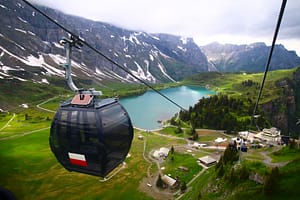LANGUAGE
German, French, Italian and Romansh
CURRENCY
Swiss franc
BEST TIME TO VISIT
July to August and December to January
NEAREST RAILWAY STATION
Zürich Hauptbahnhof (Zurich station)
NEAREST AIRPORT
Zurich airport (ZRH)
EMERGENCY HELPLINE NUMBER
112
INTERNET ACCESS
Public wireless access points can be found at major airports, at dozens of Swiss train stations and airports, and in business seats of 1st-class train carriages on many routes. Most hotels have free wi-fi, as do many cafes and public spaces. Public hot spots, like those provided by Swisscom (www.swisscom.ch), levy a charge – from Sfr5 per day to Sfr35 per month, payable by credit card or prepaid card sold at Swisscom’s 3400 hot spots; locate them at http://hotspotlocator.swisscom.ch. The odd internet cafe can be found in larger towns and cities.
VISA
Generally not required for stays of up to 90 days. Some non-European citizens require a Schengen Visa.
For up-to-date details on visa requirements, go to the Swiss State Secretariat for Migration (www.sem.admin.ch). Visas are currently not required if you hold a passport from the UK, Ireland, the USA, Canada, Australia or New Zealand, whether visiting as a tourist or on business. Citizens of the EU, Norwegians and Icelanders may also enter Switzerland without a visa. A maximum 90-day stay in a 180-day period applies, but passports are rarely stamped.
Other non-European citizens wishing to come to Switzerland have to apply for a Schengen Visa, named after the agreement that has abolished passport controls between 26 European countries. It allows unlimited travel throughout the entire Schengen zone for a 90-day period. Apply to the consulate of the country you are entering first, or your main destination.
In Switzerland, carry your passport at all times. Swiss citizens are required to always carry ID, so you will also need to be able to identify yourself at any time.
HOTEL
Excellent hotels in all categories for families, groups, couples, or singles are spread around both sides of the Reuss River as it empties into Lake Lucerne. Travelers should stay in or near the car-free, cobblestoned Old Town (Altstadt), a diminutive section of the north side of this tiny town connected to the southern area (city center) by a series of bridges, including the iconic Chapel Bridge, a 14th-century, wooden pedestrian bridge and the oldest covered bridge in Europe. Because the city is so compact, even rooms in the city center are an easy walk to Old Town sightseeing, shopping, and curiosities.
LUXURY
Hotel Schweizerhof Luzern
Palace Luzern
Renaissance Lucerne Hotel
MID- RANGE
Hotel Krone Luzern
Hotel Hofgarten
Radisson Blu Hotel, Lucerne
BUDGET
Hotel Alpha
ibis budget Luzern City
Hotel Restaurant Spatz
COST OF LIVING
Similar to everywhere else in Switzerland, things in Lucerne are very expensive, even by European standards. Sit-down meals and drinks in bars will drain your budget before you even realize it, so visitors who want to keep costs down will self-cater at least one or two meals a day. Hotels and hostels in Lucerne are also predictably expensive, although most places have good locations in or near the center, so at least you’ll be close to the action. Peak season (when most visit) runs from June into September. During these months you’ll find great weather, lots of tourists, shops and restaurants with open doors and higher hotel prices. October is considered the off season and is a great month to find hotels with lower prices. Keep an eye out for weekend travel deals. November to the middle of April is when tons of skiers come into town to take advantage of the fresh powder. Prices are in the middle range during this time with most open hotels being ski lounges.

